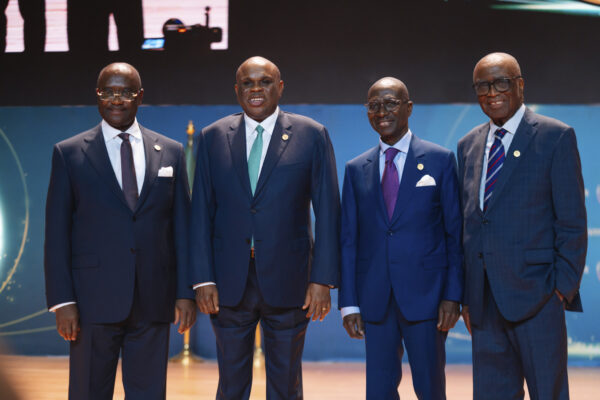Photo caption: The successive presidents of Afreximbank gathered in Cairo: Christopher Edordu, Jean-Louis Ekra, Benedict Oramah, and George Elombi – four leaders, four generations of a shared Pan-African vision of finance and trade.
On October 24, 2025, in Cairo, Professor Benedict Oramah delivered his final speech as president of Afreximbank, thirty-one years after joining the institution he helped shape. In a dense speech, filled with history and strategic insight, he took stock of the bank, its projects, and its contradictions. “Our philosophy was based on the conviction that the only viable path for the development and economic empowerment of Africa was to methodically overturn the colonial strategy of ‘divide and rule’ and ‘divide and conquer’, which for decades kept Africa and peoples of African descent in the dust of despair and resignation,” he declared to a full room.
Oramah, a field economist turned continental development strategist, recalled the foundations of a vision: to make Afreximbank an instrument for the structural transformation of African trade, rather than just a financing window. His creed, forged since 2015, was based on a deliberate break from the logic of assistance: building economic sovereignty through the circulation of goods, capital, and ideas within the continent. Intra-African trade as a lever for empowerment, rather than external trade as perpetual dependence. “We knew that for structural transformation to occur, established positions had to fall. But we also knew that they would not fall easily; so, if we chose to engage in this fight, we had to have the courage, determination, skills, and patience necessary to see it through to the end,”
Under his presidency, the bank led a true institutional front. Financial infrastructures piled up: the operational implementation of the AfCFTA, the launch of the pan-African payment and settlement system (PAPSS), the creation of the AfCFTA Adjustment Fund and transit insurance window, the harmonization of nearly 500 industrial standards, the periodic holding of intra-African trade fairs (IATF), and the development of economic zones and continental industrial hubs
. In addition, emergency interventions included: ten billion dollars injected during the pandemic, two billion for vaccine purchases, and an eightfold increase in the total balance sheet, from six to forty-four billion dollars.
But behind the inventory, the message is clear: the African sovereignty project remains unfinished. Oramah warns – without fanfare – that the challenges of the next decade will be more technical, more political as well: state indebtedness, regulatory normalization, financial discipline, and institutional consolidation. The outgoing president mentions an Africa still exposed to exogenous shocks, but now better equipped to resist them.
In the background, this speech also marks the transition to another cycle. Dr. George Elombi, a long-time companion, becomes president in his turn. A trained lawyer, he inherits a stronger, but more exposed, institution, in an environment where compliance, governance, and sovereign risk management have become existential priorities.
Afreximbank is thus entering a phase of balance: after construction, consolidation; after conquest, rigor. The bank of African integration will now have to measure itself against itself and against the yardstick of rating agencies.


